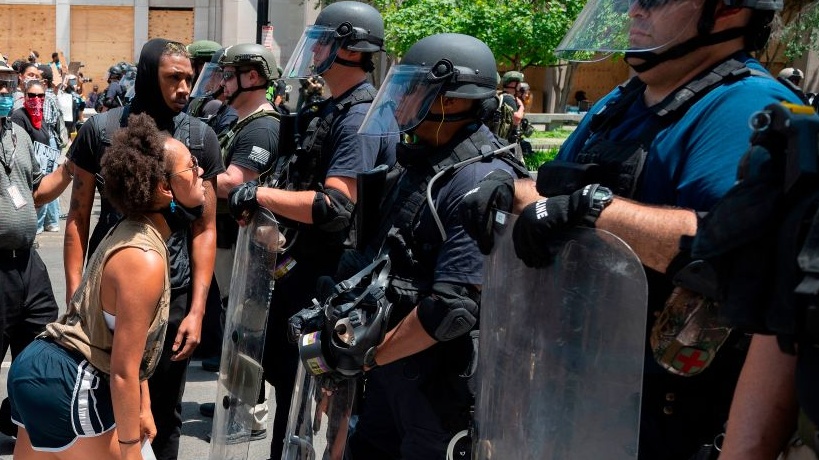According to a leaked memo obtained by BuzzFeed News, Attorney General William Barr gave the Drug Enforcement Administration (DEA) wide-ranging authority to investigate U.S. citizens involved in protests over the death of George Floyd, even if their alleged crimes are not drug-related.
As protests have grown across the country, police departments and the National Guard have faced criticism for using aggressive tactics to quell demonstrations.
Timothy Shea, who was appointed as the acting administrator of the DEA just weeks ago, explained in a memorandum that the administration is limited to only enforcing federal crimes related to drugs and "as the federal crimes being committed in the wake of Mr. Floyd's death are largely not drug-related, DEAS's ability to assist our counterparts is limited."
However, Shea added that "the attorney general is authorized to designate DEA to perform other law enforcement duties as he may deem appropriate."
Last week, Barr authorized Associate Deputy Attorney General Bradley Weinsheimer to approve the memo, granting the new authority to the DEA. Barr also shared a controversial press release that stated: "the violence is planned, organized, and driven by anarchistic and far-left extremists, using antifa-like tactics, many of whom travel from out of state to promote the violence."
"We must have law and order on our streets and in our communities, and it is the responsibility of the local and state leadership, in the first instance, to halt this violence. The Department of Justice … and all of our 93 U.S. Attorneys across the country, will support these local efforts and take all action necessary to enforce federal law," Barr continued.
The leaked memo states that when authorized by Barr, the DEA will be allowed to conduct law enforcement activities similar to almost any other enforcement agency in the country.
"If this request is granted, DEA Special Agents and Task Force Officers will, as necessary: conduct covert surveillance, and protect against threats to public safety; share intelligence with Federal state, local, and tribal counterparts; if necessary intervene as federal law enforcement officers to protect both participants and spectators in the protests; and if necessary, engage in investigative and enforcement activity, including but not limited to, conducting interviews, conducting searches, and making arrests for violations of Federal law," the memo states.
Additionally, there have been concerns about President Donald Trump's decision to use the National Guard, military and other security forces to respond to the protests.
NYC, CALL UP THE NATIONAL GUARD. The lowlifes and losers are ripping you apart. Act fast! Don’t make the same horrible and deadly mistake you made with the Nursing Homes!!!
— Donald J. Trump (@realDonaldTrump) June 2, 2020
Trump and the White House have defended his decision, saying riots and looting need to be addressed by law enforcement.
However, there is already concern within the military about how Trump is using its forces and how he plans to address the protests. Defense Secretary Mark Esper came out on Wednesday and said he disagreed with Trump's idea of potentially invoking the Insurrection Act, which would allow the president to use the military as domestic law enforcement.
“The option to use active-duty forces in a law enforcement role should only be used as a matter of last resort and only in the most … dire of situations. We are not in one of those situations now,” Esper said at a press conference, causing anger in the White House.
NEW: Defense Sec. Esper: "I do not support invoking the Insurrection Act."
“The option to use active-duty forces in a law enforcement role should only be used as a matter of last resort and only in the most … dire of situations. We are not in one of those situations now.” pic.twitter.com/GlCC42n9iT
— NBC Politics (@NBCPolitics) June 3, 2020
Multiple DEA sources who spoke to BuzzFeed said the leaked memo was concerning because it may lead to abuse of power by the Justice Department. Both the military and law enforcement have been used before to end protests, including Occupy Wall Street and the protests over Michael Brown's death.
“Drug enforcement agents should not be conducting covert surveillance of protests and First Amendment protected speech. That kind of monitoring and information sharing may well constitute unwarranted investigation of people exercising their constitutional rights to seek justice. The executive branch continues to run headlong in the wrong direction,” Hugh Handeyside, a senior attorney for the ACLU, told BuzzFeed.

